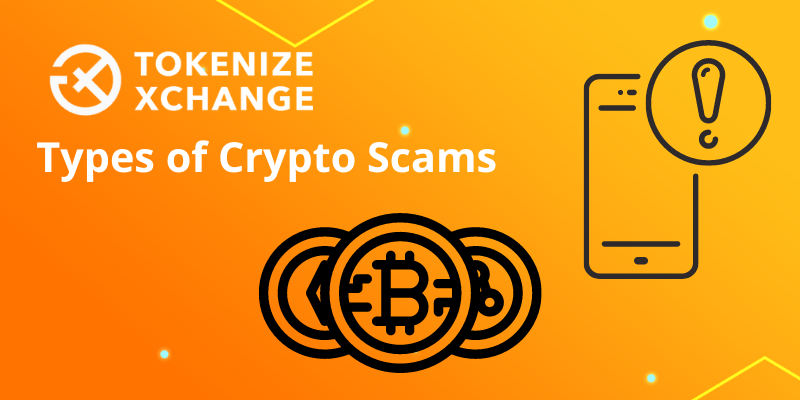
With the rapid rise in the popularity of cryptocurrencies in recent years, many are turning to these digital assets as a path to wealth and financial freedom. However, scammers are taking advantage of the influx of new people coming into the space, with $14 billion in cryptocurrency lost or affected by scams in 2021 alone. This represents a rise of 79% in losses from crypto-related crime as compared to 2020. Therefore, it is important to ensure that your cryptocurrency assets are secured and that you do not give out any personal data to a third party. Below are a few of the common crypto scams that are commonly encountered by users:
- Fake cryptocurrency trading websites
To hook unsuspecting users in, these scammers will set up a fake website that usually looks like a copy of a legitimate website. Without clear scrutiny, one could easily fall prey to the branding, the domain, or the content of the website that looks almost the same as legitimate crypto trading websites.
In most cases, fake domains, which are difficult to distinguish from original websites, are used to lure users into their sneaky traps. For example, replacing the letter’ i’ with the ‘l’ or the number ‘1’. Once a user clicks the link to be directed to the fake look-alike website, malware will be installed on the user’s device and the credentials will be stolen from their web activities.
- Fake cryptocurrency trading applications
Apart from using the trading website, people also use trading apps installed on their phones. There are fake crypto apps that one can find on the Google Play Store or AppStore that promises unrealistically high or guaranteed returns within a very short period. One should always beware that if a promise of guaranteed profits sounds too good to be true, as most often it probably is. Never deposit your assets such as fiat and cryptocurrencies into these applications as it may result in the loss of your assets.
- Social media and email scam messages
Social media is widely used and is indispensable for many in their lives hence this is also where crypto scammers find a good place to prey. Scammers will often contact the victim directly via social media direct messages or giveaway posts to offer a trade with guaranteed returns. Bear in mind that scammers could also hack your friends’ social media accounts to contact you. These accounts may be imposters or even impersonating bots.
Scammers use a similar approach by email. Scammers will create nice-looking and convincing emails just like with websites. Once a user clicks to open a congratulatory email offering cash, cryptocurrencies or NFTs as a reward for a fake giveaway.
For example, scammers will ask you to send some crypto to verify your wallet address and later promise to give you more once verification is complete. Once you send your crypto, the scammer will usually go silent and disappear from sight. These scammers could also empty all your assets inside the connected wallet, so if you receive this kind of message or email, it is best to ignore them.
- Investment scam
Scammers attract users with the sweet promise of high returns in a short period of time, as long as one opts to follow their ‘not-to-be-missed golden opportunity. They promise to help you gain a good interest return, but you will have to pay some ‘necessary fees’ such as transaction fees, registration fees, profit release fees etc., to get the profits credited.
There are three main types of investment scams you should know:
- Investment programs or packages – Often impersonating as agents of a regulated company, these scammers offer an ‘easy’ way for investors to profit. Simply sign up for their attractive programs or packages, deposit funds and profits will be paid out accordingly. Needless to say, once funds are deposited, hoodwinked investors will sooner or later find out that such profits do not exist and will never be paid out.
- Exit scam – A company will raise money with an initial coin offering (ICO). But it later exits after stealing the funds without having created a product.
- Rug pull scam – When developers introduce a new token, they will pump up the price and promote its “utilities” to make it attractive for others to buy the token. After developers extract as much value as possible from these tokens, they will abandon the project and the value of the tokens will decrease significantly.
- Phony job offers
Instead of persuading you to put your money into crypto, some scammers offer you a job handling crypto, promising a competitive salary in return. Fraudsters will post fake job offers on employment websites searching for people to mine crypto, sell it online, recruit other investors, or help with converting cash to Bitcoin.
In some cases, the scammers charge the applicant a fee to apply for the job, and they steal your money and personal information too. In other cases, they put you to “work” converting cash to crypto, except the cash transfers to you end up being cancelled. This is a variant of the classic returned cheque scam often practised on senior citizens.
As the cryptocurrency space is still a new industry, scammers are taking advantage of the lack of regulation in order to prey on unsuspecting victims by appearing to be legitimate.
Therefore, users must be vigilant and never share any personal information, data or wallet addresses with any third party. Always ensure that you are using the official Tokenize Malaysia trading website or application before depositing fiat or crypto into your account. Contact our Support Team if you have any concerns and we will investigate the issue for you.